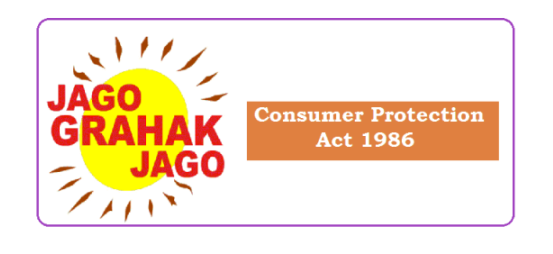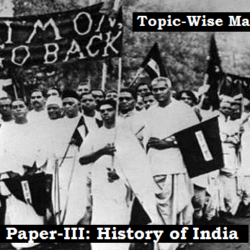
The Consumer Protection Act, 1986 (amended in 2019) lays down the rights of the consumers and provides for promotion and protection of the rights of the consumers. A consumer is any person who buys any goods for a consideration and user of such goods. The provisions of the Act cover goods as well as services.
The goods are those which are manufactured or produced and sold to consumers through wholesalers and retailers. The services are in the nature of transport, telephone, electricity, housing, banking, insurance, medical treatment, etc.
| Table of contents |
| 1. Salient Features 2. Consumer Protection Act, 2019 (Amended) 3. National Consumer Day 4. Questions from CGPSC Mains Examinations |
Salient Features
Structure:
- The Act mandates establishment of Consumer Protection Councils at the Centre as well as in each State and District, with a view to promote consumer awareness.
- It also provides for a 3-tier structure for inexpensive, speedy and summary redressal of consumer disputes.
- Quasi-judicial bodies have been set up in each District and State and at the National level, called the District Forums, the State Consumer Disputes Redressal Commissions and the National Consumer Disputes Redressal Commission respectively.
- Each District Forum is headed by a person who is or has been or is eligible to be appointed as a District Judge and each State Commission is headed by a person who is or has been a Judge of High Court. The National Commission is headed by a sitting or retired Judge of the Supreme
Court.
Appeal:
- If a consumer is not satisfied by the decision of a District Forum, he can appeal to the State Commission. A consumer can appeal to the National Commission against the order of the State Commission.
- The National Commission also exercises appellate and revisional jurisdiction from the orders of State Commissions or the District fora.
- If any person aggrieved is by an order of the National Commission, he may prefer an appeal to the Supreme Court within a period of 30 days after the order is passed.
Consumer Rights: Six rights (HIS CAR) under Section 2 (9)
- Right to safety (S) against the marketing of goods and services which are hazardous to life and property
- Right to be informed (I) about the quality, quantity, potency, purity, standard and price of goods or services
- Right to choose (C), wherever possible, access to a variety of goods and services at competitive prices
- Right to be heard (H) and to be assured that consumer’s interests will receive due consideration at appropriate forums
- Right to seek redressal (R) against unfair trade practices or restrictive trade practices or unscrupulous exploitation of consumers
- Right to consumer awareness (A)
Complaint Filing:
- A written complaint can be filed before the District Consumer Forum for pecuniary value of up to 1 Crore Rupees, State Commission for value up to 10 Crore Rupees and the National Commission for value above 10 Crore Rupees.
- If the complaint is against defective goods, the consumer is empowered to take sample of the
good for testing. - In the complaint/appeal/petition submitted under the Act, a consumer is required to pay a nominal fee.
- In the event of death of a complainant who is a consumer or of the opposite party against whom the
complaint has been filed the proceedings will not come to a halt. The legal heir of the complainant or the opposite party can represent. The proceedings can be instituted or continued.
Thus, the Act has enabled ordinary consumers to secure less expensive and often speedy redressal of their grievances.
Consumer Protection Act, 2019 (Amended)
The original Act was amended in 2019 and came into effect on 20th July 2020. The New Act has certain new provisions that tightens the existing rules to further safeguard consumer rights and create exhaustive consumer protection law.
New provisions under Consumer Protection Act 2019:
- Inclusion of E-commerce, Direct selling
- Establishment of Central Consumer Protection Authority (CCPA)
- Strict Norms for Misleading Advertisement
- Strict Norms for product liability
- Changes in the Pecuniary Jurisdiction
- Greater ease to dispute resolution
Addition in the clause of “Unfair Trade Practice”: - Unfair Contract between a manufacturer or trader or service provider
- Alternate Dispute Resolution through mediation by establishing Consumer Protection Councils at 3 levels
The CCPA will have an investigation wing, headed by a Director-General, which may conduct inquiry or investigation into such violations.
The Central Consumer Protection Council (CCPC) will be an advisory body on consumer issues, headed by the Union Minister of Consumer Affairs, Food and Public Distribution with the Minister of State as Vice Chairperson and 34 other members from different fields. It will have a three-year tenure.
A person aggrieved by any order passed by the Central Authority may file an appeal to the National Consumer Disputes Redressal Commission (CDRC) within a period of thirty days from the date of receipt of such order. A complaint can be filed online through http://edaakhil.nic.in/

National Consumer Day
In India, 24th December is observed as National Consumer Day. On this day the Consumer Protection Act, 1986 had received the assent of the President. The enactment of this Act was considered as a historic milestone in the consumer movement in the country. Jago Grahak Jago is a consumer awareness programme from Ministry of Consumer Affairs, Government of India.
March 15 every year is celebrated as World Consumer Rights Day. The theme of the World Consumer Rights Day 2024 is “Fair and responsible AI for consumers”.
| Questions from CGPSC Mains Examinations |
| 2022 1. Explain ‘person’ under Consumer Protection Act 2019. (2 marks) उपभोक्ता संरक्षण अधिनियम 2019 के अंतर्गत ‘व्यक्ति’ को समझाईए। (2 अंक) 2. Describe the objectives of the Central Consumer Protection Council under the Consumer Protection Act 1986. (04 marks) उपभोक्ता संरक्षण अधिनियम 1986 के अंतर्गत केंद्रीय उपभोक्ता संरक्षण परिषद के उद्देश्यों का वर्णन कीजिये। (04 अंक) |
| 2020 How much compensation can be claimed under District Consumer Forum? (2 marks) जिला उपभोक्ता फोरम के तहत कितने मुआवजे का दावा किया जा सकता है? (2 अंक) |
| 2019 Discuss the ‘Consumer Protection Act 1986’. (8 marks) ‘उपभोक्ता संरक्षण अधिनियम 1986’ की विवेचना कीजिए। (8 अंक) |

 Home
Home Syllabus
Syllabus Contact Us
Contact Us




